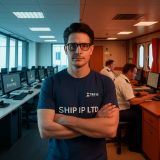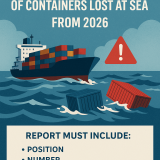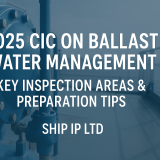The shipping industry is in the spotlight Regardless of the Suez Canal blockade which has stolen the headlines during the past few days, the maritime industry’s importance in the supply chain and the flow of commodities and goods around the world has been highlighted, perhaps in the most prominent way, during the pandemic (27 March 2021). More…
Container and shipping shortage piles pressure on prices The rapid recovery of the global economy that started at the end of the first wave has come with a much faster rebound in global trade than initially expected. This has come with significant supply chain disruptions causing many different types of shortages (02 April 2021). More…
IMO-Singapore Maritime Single Window seeks pilot project; Aus governments and seaports must up their game The International Maritime Organization and the Government of Singapore are seeking expressions of interest from countries with a “medium sized port” for a pilot project to establish a system of electronic data exchange.(26 March 2021). More…
ITF wants Aswan Shipping vessels banned from Australian waters The International Transport Workers Federation (ITF) has called for Australia to ban the ships of Aswan Shipping after two of its bulkers were detained over serious technical problems and labour rights issues. Detained over the past two months by the Australian Maritime Safety Authority (AMSA) are Aswan’s 97,000-dwt bulker Maryam (built 2004) and 91,800-dwt-dwt bulker Movers 3 (built 2002) (29 March 2021). More…
Shipping Australia: Interim supply chain study indicates Australia has limited vulnerability The supply of essential goods and services in Australia is not highly susceptible to a short-term disruption to the supply of imported goods, the Productivity Commission has found in its interim report. Vulnerability appears to be quite limited (26 March 2021). More…
Vulnerable supply chains in the spotlight The Productivity Commission’s interim report on Vulnerable Supply Chains suggests Australia is resilient to disruption through our ability to pivot but seeks confirmation from industry. HVIA’s Government Relations and Advocacy Manager Greg Forbes said the draft report predominantly focusses on disruptions to imported commodities, whereas the final report will also consider disruptions that can affect exports (30 March 2021).. More…
Australia detains two Qatari-owned vessels for labor violations Australian maritime authorities have detained two vessels owned by a Qatari shipping company for labor and safety violations. The International Transport Workers’ Federation has been working with the Australian authorities to provide relief for the crew trapped aboard the vessels while the owners address the deficiencies (25 March 2021). More…
NSW Ports welcomes the largest container ship (by length) at Port Botany NSW Ports was pleased to welcome the largest container ship (by length) at Port Botany this week, with the safe arrival of the Maersk Soroe at DP World Australia’s terminal. The empty sweeper is a welcome arrival, assisting in alleviating empty container build up caused by ‘pandemic buying’, as Australian consumers spend money on imported goods (01 April 2021). More…
Firefighters forced into COVID isolation after fire on cargo ship off WA coast Firefighters are told to self-isolate after battling a blaze aboard a cargo ship off Port Hedland — the ship’s crew had not been given clearance to disembark (25 March 2021). More…
Raising the bar! AAT continues to modernise its equipment to facilitate increased productivity and efficiency across stevedoring operations. AAT worked in collaboration with Liebherr and the Port of Brisbane to ensure that the design and assembly met the manufacturers exacting standards, and was in accordance with strict wharf specifications (01 April 2021). More…
Australian first: New report proves long-held belief that good vehicle maintenance improves road safety A new report from Australia’s largest trucking insurer and the industry regulator has confirmed operators who effectively maintain their vehicles are less likely to be involved in an incident. For the first time, the trucking industry regulator and leading insurer have shared de-identified critical road crash data, with the aim of improving road safety (31 March 2021). More…
Crash stats analysis sees maintenance and safety correlation While it may seem self-evident that good truck maintenance is linked to better safety outcomes, insurer NTI and the National Heavy Vehicle Regulator (NHVR) have crunched the numbers to frank the assumption – with caveats (31 March 2021). More…
New heavy vehicle charge puts undue pressure on operators McKellar was responding to the decision by transport ministers last night to increase truck fuel and registration charges by substantially more than inflation from June 2021, by 2.5 per cent. The decision will increase the registration charge for a workhorse prime mover and semi-trailer by $144 a year, and the effective rate of fuel tax by 0.6 cents per litre (31 March 2021). More…
HV road charges must be revised Infrastructure and Transport Ministers recently indicated that, in their view, there was a growing gap between road expenditure and revenue from charges, and have decided to increase heavy vehicle charges by 2.5% (road user charge and registration costs).The NatRoad CEO has said the model used to estimate the heavy vehicle share of expenditure on roads is not reliable (01 April 2021). More…
ATA: Vehicle maintenance key to road safety Following the release of a joint roadworthiness report from National Transport Insurance (NTI) and the National Heavy Vehicle Regulator (NHVR), the Australian Trucking Association (ATA) said that keeping well maintained vehicles was key to trucking safety and productivity (02 April 2021). More…
Heavy Vehicle Safety Strategy consultation The NHVR is seeking feedback on the draft Heavy Vehicle Safety Strategy 2021-2025, which sets out the NHVR’s strategic ambitions to improve heavy vehicle safety outcomes and contribute to a reduction in the number of crashes, fatalities and serious injuries involving heavy vehicles (23 March 2021). More…
ATA demands dimension reform to enable modern trucks The Australian Trucking Association (ATA) has taken aim at local truck dimension restrictions, saying the current rules prohibit the latest vehicle technology to enter Australian shores and must be overhauled (29 March 2021). More…
NHVR partners with peak engineering body on road access project The NHVR is partnering with the Queensland peak body for public works engineers to help deliver the Strategic Local Government Asset Assessment Project (SLGAAP). The Institute of Public Works Engineering Australasia Queensland (IPWEAQ) is providing invaluable support to the project, including helping to develop the Asset Assessment Framework (23 March 2021). More…
ATA calls for fairer increases to truck charges The Australian Trucking Association (ATA) is calling on governments not to increase truck road user and registration charges by more than the expected inflation rate of 1.5 per cent in 2021-22 (19 March 2021). More…
NHVR welcomes Rod Hannifey’s appointment as NRFA president The NHVR has welcomed the appointment of well-known trucking safety advocate Rod Hannifey as president of the National Road Freighters Association (NRFA). NHVR CEO Sal Petroccitto said Mr Hannifey’s appointment would ensure smaller operators continue to have a strong voice when it comes to heavy vehicle safety reform (30 March 2021). More…
Published – articles, papers, reports
Are good trucks the sign of a great operator? National Truck Accident Research Centre (NTARC): March 2021 A special report into heavy vehicle roadworthiness, brings together for the first time de-identified data from NTI’s NTARC Major Accident Investigation Report (MAIR) and the NHVR’s National Roadworthiness Baseline Survey (NBRS). More…
ATSB Latest Investigations
Fire on board ‘BBC Rhonetal’ while berthed in Port Hedland on 25 March 2021 New Investigation – At 0330 WST, during cargo discharge operations from the ’tween deck of number 2 cargo hold, smoke was seen coming from the lower hold. Just prior to this, hot work had been undertaken to remove cargo securing points from around the cargo to be discharged. Efforts to extinguish the fire using ship’s fire fighting resources laid out for the hot work were unsuccessful. More…
NHVR: Newsletter Fortnightly newsletter providing important information on the heavy vehicle industry, including the latest NHVR news and events, relevant law and policy changes. More…
Australian Bureau of Statistics 01 April 2021 – International Trade in Goods and Services, Australia. More… 24 March 2021 – International Merchandise Trade, Preliminary, Australia, February 2021. More… 24 March 2021 International Merchandise Trade: Confidential Commodities List. More…
Practice and Regulation
IFAM Extension of the International Freight Assistance Mechanism to September 2021 Extension to the International Freight Assistance Mechanism (IFAM) to ensure commercially viable access to market for Australian exporters of perishable commodities to the end of September 2021. For more information about the extension, please refer to the IFAM webpage and latest fact sheet.
Productivity Commission: Vulnerable supply chain review The Productivity Commission is undertaking a “Vulnerable Supply Chain Review” with an interim Report expected in Late March. The Commission will be taking written submissions on the interim report until April 2021, before producing its final report.
Productivity Commission review into supply chain vulnerabilities Freight & Trade Alliance (FTA) and the Australian Peak Shippers Association (APSA) evidence provided to the Joint Standing Committee on Foreign Affairs, Defence and Trade ‘Inquiry into the Implications of the Covid-19 pandemic for Australia’s foreign affairs, defence and trade’ highlighted the needs for a paradigm shift in government priorities in favour of exporters, importers and logistics providers. In response, we are delighted to advise that the Productivity Commission has released its interim report on Vulnerable Supply Chains Submissions are due by 30 April 2021 (26 March 2021). More…
AMSA Current Marine Notice 2021/01 Focused inspection campaign—livestock ships – Port State control This marine notice provides information to ship owners, operators and masters about the Focused Inspection Campaign (FIC) on livestock ships which will run from 1 March 2021 to 31 August 2021. More…
Focused inspection campaign—float-free EPIRBs We will undertake a focused inspection campaign (FIC) on float-free EPIRB requirements on domestic commercial vessels over the period 1 February to 30 April 2021. More…
Maritime Safety Awareness bulletin issue 13, March 2021—Preventing container loss In issue 13, read about how container loss affects the environment and what measures should be taken to prevent it from happening. Find out about the impact of container loss on safety and the environment and what measures should be considered to prevent it from happening. Read issue 13 of the Maritime Safety Awareness Bulletin.
AMSA: Domestic Commercial Vessel (DCV) safety alert If you are currently operating under an exemption that expires on the 30 June 2020, it has now been automatically extended for 5 years, until 30 June 2025.This Alert is to advise vessel owners, operators, masters, coxswains and crews that the AMSA has taken steps to extend the duration of all National Law certificates of competency. More…
Draft Future Fuels Strategy The Government’s draft strategy is built around three central principles: addressing barriers to the roll out of new vehicle technologies; investment in early-stage infrastructure to stimulate the market and private sector and improving access to information to help people make informed choices. Comments on the discussion paper are open until 2 April 2021. More…
Commonwealth modern slavery statement paper This would report on modern slavery risks in the Government’s procurement and investment activities and explain the steps taken to identify and respond to those risks, and link with Australia’s Modern Slavery Act 2018. The first Commonwealth Modern Slavery Statement will be published before 31 December 2020. The Commonwealth Modern Slavery Statement scoping paper is available on the Department of Home Affairs website.
Port of Melbourne Modern Slavery Statement FY 2020 March 29, 2021 – Port of Melbourne has published its first Modern Slavery Statement. This has been prepared in accordance with the requirements of the Modern Slavery Act 2018 (Cth), which is an important measure to help address combatting the occurrences of modern slavery and other harmful practices. You can read our statement here.
Source: lexology





